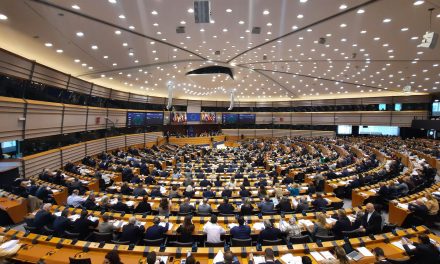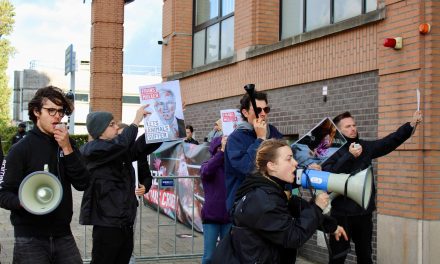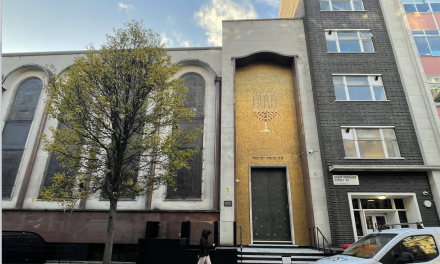This production is made by: Justine van Overeem and Suzanne Borsboom
Europe is divided. During the most recent State of the Union speech, some Members of the European Parliament (MEPs) stood dressed in red to show solidarity with Gaza, while others remained seated in silence. That moment exposed deep fractures in Europe’s stance on the Israel–Gaza war and raised urgent questions about the EU’s credibility as a peace project.
According to Gerard Jonkman, director of The Rights Forum and a Middle East expert, the division within the EU stems from two conflicting moral frameworks. ‘Countries such as Germany, Austria, and the Netherlands act out of guilt over the Holocaust’, he explains. ‘Others, including Spain, Ireland, and Belgium, base their positions on international law and human rights.’
This historical tension, Jonkman argues, has long paralyzed European foreign policy. Article 1 of the Genocide Convention obliges states to act when there is a serious risk of genocide, a risk some international bodies say exists in Gaza today. Yet the EU has been unable to reach the unanimous agreement required to turn those obligations into concrete action.
Three Europes
Analysts from the Clingendael Institute describe the EU’s member states as split into three broad camps: one staunchly pro-Israel, one strongly pro-ceasefire, and a fluctuating middle group trying to balance both sides. Since October 2023, EU statements have largely reflected the first group’s influence, carefully formulated sentences of Hamas, calls for humanitarian pauses, but no binding actions.
This imbalance has consequences beyond Brussels. The EU’s failure to take a unified stance, Jonkman warns, is eroding its credibility as a peacekeeper. ‘Europe was built on the idea of promoting peace and human rights’, he says. ‘Yet we now apply double standards, imposing sanctions on Russia for violating international law, but hesitating to take similar measures against Israel.’
The street’s frustration
On the streets, however, the message is clear. Since the start of the war, large-scale pro-Palestinian demonstrations have swept across Europe. In Brussels, protesters set up a permanent “People’s Encampment for Palestine” in front of the European Commission’s headquarters. According to police figures, the number of demonstrators there grew from 12,000 in October 2023 to 27,000 by early 2024. In Spain, more than 70,000 marched through Barcelona demanding a ceasefire, and rallies in The Hague and Berlin have drawn tens of thousands more.
Public opinion mirrors that energy. A YouGov survey from early 2025 found that in Germany, France, and Italy, fewer than 20 percent of respondents view Israel’s campaign in Gaza positively. In Spain, 78 percent support recognition of a Palestinian state, and in the Netherlands, a majority say the EU should ‘do more to stop the violence.’
Not a moral crisis, a procedural one
Despite this growing pressure, Europe’s paralysis persists. For Jonkman, the problem is structural rather than ethical. ‘If the EU could make foreign policy decisions by qualified majority instead of unanimity, it could act’, he says. ‘Even a coalition of willing states would be a step forward.’
The European Union has said a lot about the war in Gaza, but demonstrators feel that the actions of the EU have been lacking. Member states are openly divided over the Israel-Gaza conflict, and this division is paralyzing Europe’s response. This reportage explores how deep these divisions run, and how people on the streets feel about it. You can watch the video below:




